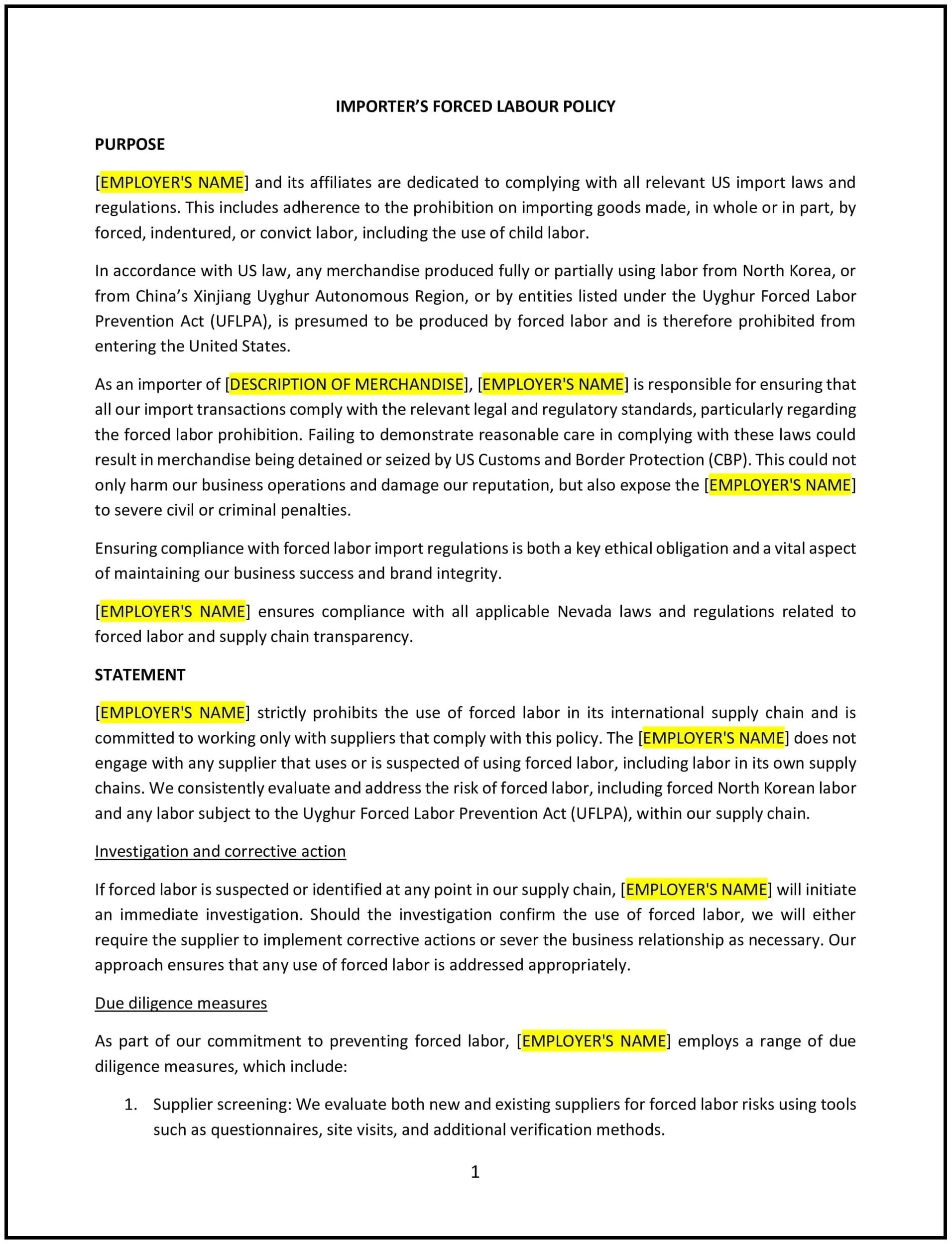Importer’s forced labour policy (Nevada): Free template
Got contracts to review? While you're here for policies, let Cobrief make contract review effortless—start your free review now.

Customize this template for free
Importer’s forced labour policy (Nevada)
This importer’s forced labour policy is designed to help Nevada businesses ensure that their supply chains and imported goods comply with federal and state regulations prohibiting the use of forced labor. The policy outlines the company’s commitment to ethical sourcing, supplier accountability, and compliance with U.S. Customs and Border Protection (CBP) and other regulatory standards.
By adopting this policy, businesses can mitigate legal risks, promote ethical practices, and strengthen their reputation as socially responsible organizations.
How to use this importer’s forced labour policy (Nevada)
- Establish supplier standards: Define clear expectations for suppliers, including a commitment to avoiding forced labor, adhering to fair labor practices, and complying with applicable laws and regulations.
- Conduct risk assessments: Regularly evaluate supply chains to identify potential risks related to forced labor. Focus on regions or industries known to have higher incidences of forced labor.
- Implement due diligence procedures: Require suppliers to provide documentation, certifications, or audits demonstrating compliance with forced labor prohibitions. Use third-party verification where necessary.
- Monitor supply chain practices: Conduct regular audits, on-site inspections, or reviews of supplier operations to ensure compliance with the company’s standards. Address noncompliance promptly and effectively.
- Include contractual obligations: Incorporate anti-forced labor clauses into contracts with suppliers, specifying penalties for noncompliance, including termination of the business relationship.
- Train employees and partners: Provide training for employees, suppliers, and other stakeholders to raise awareness of forced labor risks and the company’s expectations for ethical sourcing.
- Report violations: Establish clear procedures for reporting suspected forced labor within the supply chain, ensuring that whistleblowers are protected and investigations are conducted promptly.
- Comply with import regulations: Ensure that all imported goods comply with U.S. laws, including the U.S. Tariff Act, which prohibits the importation of goods produced with forced labor.
Benefits of using this importer’s forced labour policy (Nevada)
This policy provides several key benefits for Nevada businesses:
- Promotes ethical sourcing: Ensures that goods are sourced responsibly, protecting workers’ rights and adhering to fair labor practices.
- Reduces legal risks: Complies with federal laws, including the U.S. Tariff Act, and avoids penalties or import restrictions.
- Enhances brand reputation: Demonstrates a commitment to corporate social responsibility, which can strengthen customer trust and loyalty.
- Supports supply chain accountability: Establishes clear expectations for suppliers and promotes transparency in business operations.
- Minimizes operational disruptions: Proactively addressing forced labor risks reduces the likelihood of regulatory actions or supply chain interruptions.
Tips for using this importer’s forced labour policy (Nevada)
- Communicate expectations clearly: Ensure that all suppliers understand the company’s stance on forced labor and the consequences of noncompliance. Share the policy with suppliers and include it in onboarding materials.
- Collaborate with suppliers: Work closely with suppliers to address risks, provide guidance on compliance, and build capacity for ethical sourcing practices.
- Use technology: Leverage tools such as supply chain management software or blockchain technology to track and verify compliance with forced labor regulations.
- Respond promptly to violations: Investigate and address suspected violations immediately to demonstrate the company’s commitment to ethical practices.
- Review and update regularly: Periodically review the policy to reflect changes in laws, supplier relationships, or industry standards.